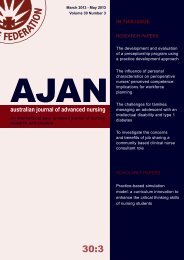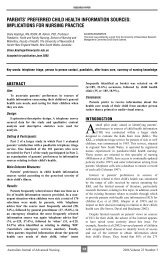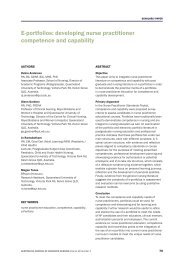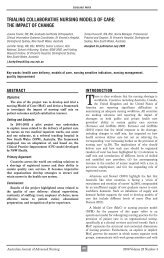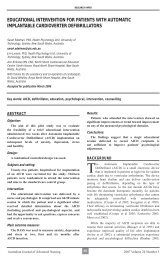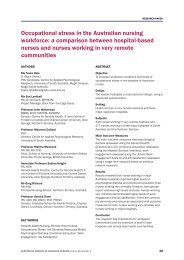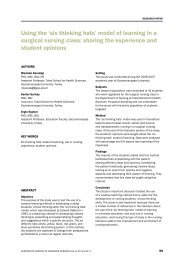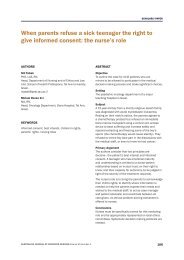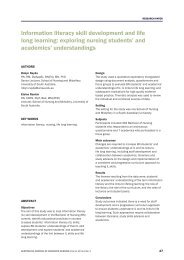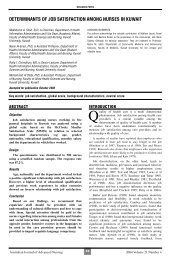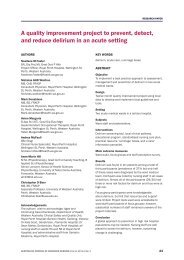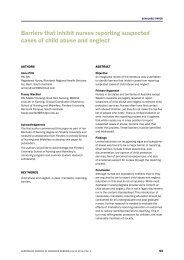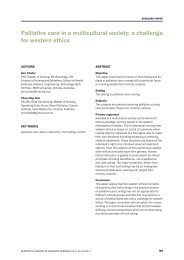australian journal of advanced nursing
australian journal of advanced nursing
australian journal of advanced nursing
Create successful ePaper yourself
Turn your PDF publications into a flip-book with our unique Google optimized e-Paper software.
Although four couples said that it was not necessary<br />
to take additional over the counter supplements<br />
if eating a healthy diet, all but three (males) were<br />
currently taking some type <strong>of</strong> supplement. One<br />
couple was concerned there were no regulations<br />
associated with over the counter supplements. The<br />
supplements being taken included; folic acid (five<br />
females), multivitamins (four males, six females),<br />
herbs mixed by a naturopath (two females, one<br />
male), primrose oil (one female), Vitamin B (two<br />
females, one male), fish oil (one female, one male),<br />
glucosamine (one female), Ovulit (one female), horny<br />
goats weed (two males), zinc (one male), selenium<br />
(one male), horseradish (one male). Four couples said<br />
that taking supplementary vitamins were necessary,<br />
because it was difficult to eat a healthy diet due to<br />
the preservatives and additives that are applied to<br />
most foods bought in the shops.<br />
The majority <strong>of</strong> participants wanted to make changes<br />
to their lifestyle (18 out <strong>of</strong> 20). These changes<br />
included; losing weight (two males, three females),<br />
eating better (two males, two females), reducing work<br />
hours (three males), exercising more (three males,<br />
four females), relaxing and reducing stress levels<br />
(one male, two females).<br />
Barriers to making these changes included:<br />
insufficient time, difficulties in finding an enjoyable<br />
exercise, lack <strong>of</strong> motivation, prioritising what is<br />
important, lack <strong>of</strong> money, lack <strong>of</strong> willpower, being tired<br />
and needing a holiday. Of the five couples who said<br />
that insufficient time was the major barrier to them<br />
making lifestyle changes, either one or both partners<br />
spent long hours working and found it difficult to<br />
prioritise exercise and sensible healthy eating into<br />
their day. Three couples said that although they<br />
wanted to make changes they lacked the motivation<br />
and willpower to do so.<br />
DISCUSSION<br />
This was a pilot study to examine the suitability<br />
<strong>of</strong> conducting individualised couple interviews<br />
focused on lifestyle factors and fertility. While there<br />
is abundant evidence <strong>of</strong> the impact <strong>of</strong> lifestyle on<br />
healthy fertility (Homan et al 2007), couple awareness<br />
SCHOLARLY PAPER<br />
and perception <strong>of</strong> the importance <strong>of</strong> lifestyle factors<br />
in relation to their own situation has not been widely<br />
researched. A recent study surveyed students about<br />
their fertility knowledge and reported that both males<br />
and females were knowledgeable about risk factors<br />
for fertility (Bunting and Boivin 2008). However, the<br />
study did not ask about the students lifestyle and<br />
how they felt it may relate to them.<br />
Being over or underweight has been shown to<br />
adversely affect the chance <strong>of</strong> conception and a<br />
healthy pregnancy (Rich‑Edwards et al 1994; Norman<br />
et al 2004; Lintsen et al 2005) and most participants<br />
were aware <strong>of</strong> this. Responses to the questions<br />
regarding weight were paradoxical. Forty per cent <strong>of</strong><br />
females were obese, they were all aware that they<br />
were significantly overweight, however only half <strong>of</strong><br />
them considered that their weight was a factor in<br />
their own infertility.<br />
Considering the strength <strong>of</strong> the evidence <strong>of</strong><br />
adverse effects on conception associated with<br />
smoking (Bolumar et al 1996; Augood et al 1998;<br />
Klon<strong>of</strong>f‑Cohen et al 2001), it is encouraging that<br />
smoking was perceived to be problematic to a<br />
pregnancy. Only one couple thought that smoking<br />
would not harm the chance <strong>of</strong> conception and two<br />
males were unsure. This is in contrast to Roth’s study<br />
<strong>of</strong> 388 females, where they found that while risks<br />
<strong>of</strong> lung cancer, respiratory and heart disease and<br />
pregnancy complications associated with smoking<br />
were well known, women were not well informed about<br />
the potential fertility risks (Roth and Taylor 2001).<br />
There is a need for increased public education <strong>of</strong><br />
fertility risks associated with smoking.<br />
Recreational drugs such as marijuana have been<br />
implicated in infertility (Park et al 2004). The use<br />
<strong>of</strong> recreational drugs was widely recognised as a<br />
negative factor for health and fertility and none <strong>of</strong><br />
this sample were present or past users.<br />
Psychological stress is common amongst the<br />
infertile population (Cousineau and Domar 2007;<br />
Hammarberg et al 2001) and six participants in this<br />
sample were feeling stressed. Although inconsistent<br />
across studies there is evidence that stress may<br />
AUSTRALIAN JOURNAL OF ADVANCED NURSING Volume 26 Number 4 82



